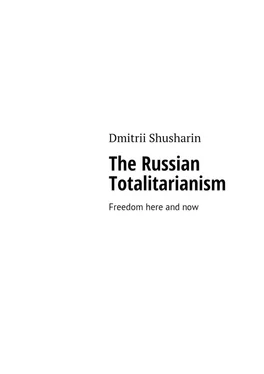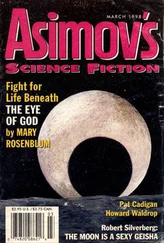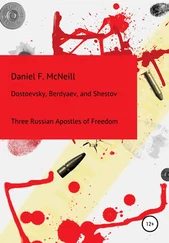Dmitrii Shusharin - The Russian Totalitarianism. Freedom here and now
Здесь есть возможность читать онлайн «Dmitrii Shusharin - The Russian Totalitarianism. Freedom here and now» — ознакомительный отрывок электронной книги совершенно бесплатно, а после прочтения отрывка купить полную версию. В некоторых случаях можно слушать аудио, скачать через торрент в формате fb2 и присутствует краткое содержание. ISBN: , Жанр: russian_contemporary, на английском языке. Описание произведения, (предисловие) а так же отзывы посетителей доступны на портале библиотеки ЛибКат.
- Название:The Russian Totalitarianism. Freedom here and now
- Автор:
- Жанр:
- Год:неизвестен
- ISBN:9785449069030
- Рейтинг книги:4.5 / 5. Голосов: 2
-
Избранное:Добавить в избранное
- Отзывы:
-
Ваша оценка:
- 100
- 1
- 2
- 3
- 4
- 5
The Russian Totalitarianism. Freedom here and now: краткое содержание, описание и аннотация
Предлагаем к чтению аннотацию, описание, краткое содержание или предисловие (зависит от того, что написал сам автор книги «The Russian Totalitarianism. Freedom here and now»). Если вы не нашли необходимую информацию о книге — напишите в комментариях, мы постараемся отыскать её.
The Russian Totalitarianism. Freedom here and now — читать онлайн ознакомительный отрывок
Ниже представлен текст книги, разбитый по страницам. Система сохранения места последней прочитанной страницы, позволяет с удобством читать онлайн бесплатно книгу «The Russian Totalitarianism. Freedom here and now», без необходимости каждый раз заново искать на чём Вы остановились. Поставьте закладку, и сможете в любой момент перейти на страницу, на которой закончили чтение.
Интервал:
Закладка:
Civil society does not need power, more precisely, it comes as a result of alienation from power. But the government, if it pretends to legitimacy and social creativity, on the contrary, needs to make the society civil. And this interest is purely applicative, for only civil society is manageable, transparent and capable of negotiating with the authorities.
<���…>
Actually, what is there to rack your brains over, guessing who and what for launches now and then in the media the horror stories about the imminent change of government, the transition of control over the economy into the hands of security services. Their only means and purpose is to bring the situation in the country to the state that we see in and around Chechnya. The greatest danger is the possibility of an armed conflict with Georgia which could be initiated by the insecure people in security forces and politicians close to them.”
That was the situation in the country as seen by 2002, at the moment of the final farewell with the right-liberal hopes. It was marked by the actions of the government sponsored youth movement “Coming Along” whose rally, which in many respects copied the Nazi burning of books, although it was directed only against one writer, Vladimir Sorokin. Instead of an embarrassment, the historical parallels served more like inspiration for the organizers. It was at that point in time when it became clear that the liberal illusions are thing of the past and the new completely different political regime was taking over. The affirmation followed very soon: the Yukos affair and the post-Beslan reform. The persecution of Khodorkovsky opened the era of raider seizures and redistribution of property, which made it clear that there was no private property and free market in Russia. As for the reforms after the terrorist attack in Beslan and the rhetoric that accompanied them, it became evident that the state was rearranged in order to indefinitely retain power in the hands of one group and one person. It was accompanied by imperial rhetoric. All in all this can be called the privatization of the state.
No stagnation at all
Political analyst Igor Zhordan identifies the following stages in the formation of a new political system since September 2004 (the terrorist attack in Beslan) until March 2007 (Putin’s Munich speech) 16 16 https://sites.google.com/site/secretrussia/home
:
• Reform of the electoral system, elimination of the minimum turnout threshold, prohibition of criticism of opponents, imitation of democratic institutions.
• Adoption of laws on extremism that equate criticism of power institutions and people in power with extremism and terrorism, as well as a law authorizing Russian special services to liquidate terrorists and extremists regardless of their whereabouts.
• The emergence of national projects, which were reduced to increasing the financing of a number of socially significant industries and the increase of corruption. Actual bribery of employees in the budgetary sphere.
• Creation of state corporations as a system of state control of branch industries with financial non-transparency of corporations themselves.
• Creation of private armed forces of Gazprom and Transneft as government power reserve.
• The almost unnoticed (neglectfully) expansion of the border zones, sometimes several times, as a result of which almost all oil and gas fields were directly controlled by the FSB. Entry into these zones requires special permission from the FSB.
In 2012, the Russian edition of Forbes published a detailed history of the Kremlin’s lawmaking activities, beginning in 2000, when a law was passed to change the principle of the formation of the Federation Council 17 17 http://www.forbes.ru/sobytiya-slideshow/vlast/84393-kratkaya-istoriya-zakruchivaniya-gaek-v-rossii/slide/1
. Systematically and methodically a new system of power had been built, isolating it from the population, which fully supported this division of labor. Consistently adopted laws changed the Russian political system: the judiciary, the party system, the electoral system, and the institution of the presidency. The laws passed after the publication of this review put an end to freedom of assembly and freedom of speech, turned NGOs into foreign agents, minimized the participation of foreign capital in the media market.
The NGO law, adopted in the summer of 2012 18 18 https://lenta.ru/news/2012/07/21/law/
, obliged non-profit organizations engaged in political activities and receiving funding from abroad to register as foreign agents. Under financing, as shown by law enforcement, it means not only grants, but also foreign accounts of NGO founders. And the concept of “political activity” could be interpreted broadly and arbitrarily.
Sometimes they say that the siloviki isolate the country, that they are the only ones who can’t be called a foreign agents. The situation is different: we should talk about their monopoly on the status of foreign agents, on the control over the financial flows from abroad.
Such connection with the outside world – raising the status within the country, writing petitions, so that at least the notion of “political activity” is not interpreted broadly, humiliatingly and meaninglessly, it’s like trying to give an exhaustive definition of “counterrevolutionary activity” in the thirties, and to clarify the connotations of anti-Soviet agitation and “knowingly false fabrications” in the seventies.
Then, in the summer of 2012, amendments were made to the law on rallies, which significantly complicated the holding of mass actions 19 19 https://slon.ru/russia/chto_zapreshchaet_novyy_zakon_o_mitingakh-796475.xhtml
. The subsequent changes are introduced gradually, expanding government’s punitive possibilities.
According to the statistics of the judicial department under the Supreme Court, 525 persons were convicted in Russia in 2015 for crimes against the foundations of the constitutional system and state security under the main articles of chapter 29 of the Criminal Code of the Russian Federation. The articles include treason, espionage, divulgence of state secrets, armed insurgency, extremism and others. It should be noted that none of the defendants under the main articles of the chapter was acquitted. Trials were held in closed sessions. A significant number of convicted were senior citizens or people who simply sent their resume abroad, makes doubtful the authenticity of the charges against them 20 20 http://newsru.com/russia/22apr2016/treason.html
.
The main thing Article 282 of the Criminal Code of the Russian Federation remains the main instrument, which allows the authorities to persecute a person for any statement, even quoting someone’s words or images, including criticism of any government activity, even the lowest level of it. In the spring of 2016, the Center for Economic and Political Reform (CEPR) issued a report on the application of this article in the previous five years. During this time, the number of convicted persons has increased three-fold according to the statistics of the judicial department under the Supreme Court, from 137 to 414 people. First of all, the number of convicts under Part 1 of this article (the incitement of hatred or enmity committed with the use of the Internet) is growing. If in 2011 there were 82 such convicts, in 2015 the number has grown to 369.
Even more serious was the increase in the number of people convicted under articles 280 and 280—1 of the Criminal Code (public calls for extremist activity and separatism) from 12 to 69 people.
In 2015, also increased the number of those who were convicted under Part 2 of Art. 280 of the Criminal Code (the same actions using the media and the Internet). Only four such cases took place in 2014, and in 2015 there were already 19. Also last year, sentences under Article 280.1 (calls for separatism) were passed for the first time in connection with the Crimea annexation.
Читать дальшеИнтервал:
Закладка:
Похожие книги на «The Russian Totalitarianism. Freedom here and now»
Представляем Вашему вниманию похожие книги на «The Russian Totalitarianism. Freedom here and now» списком для выбора. Мы отобрали схожую по названию и смыслу литературу в надежде предоставить читателям больше вариантов отыскать новые, интересные, ещё непрочитанные произведения.
Обсуждение, отзывы о книге «The Russian Totalitarianism. Freedom here and now» и просто собственные мнения читателей. Оставьте ваши комментарии, напишите, что Вы думаете о произведении, его смысле или главных героях. Укажите что конкретно понравилось, а что нет, и почему Вы так считаете.












